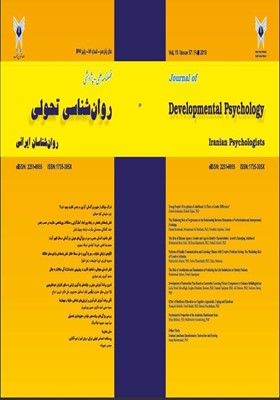-
-
List of Articles
-
Open Access Article
1 - Young People’s Perceptions of Adulthood: Is there a Gender Difference?
Zohreh Soleimani Elahe Hejazi -
Open Access Article
2 - The Mediating Role of Forgiveness on the Relationship Between Dimensions of Perfectionism and Interpersonal Problems
Hamed Kashanaki Mohammad Ali Besharat Fereshteh Rajabian Tabesh -
Open Access Article
3 - The Role of Human Agency, Gender and Age in Identity Characteristics: Arnett's Emerging Adulthood
Mohammad Reza Fathi Ali Reza Kiamanesh Farhad Jomehri -
Open Access Article
4 - Patterns of Family Communication and Learning Climate with Creative Problem Solving: The Mediating Role of Creative Attitudes
Zahra Delnavaz Mahboobeh Alborzi Fariba Khoshbakht -
Open Access Article
5 - The Role of Alexithymia and Rumination in Predicting the Life Satisfaction in Obesity Patients
Mohammad Akbari Zohreh Sayadpour -
Open Access Article
6 - Development of Instruction Plan Based on Generative Learning Theory Components to Enhance Self-Regulation
Leila Orvati Movaffagh Soghra Ebrahimi Ghavam Esmaeil Sadipour Ali Delavar Fariborz Dortaj -
Open Access Article
7 - Effect of Resilience Education on Cognitive Appraisals, Coping and Emotions
Somayeh Mohebi Omid Shokri Hosein Pourshahriar -
Open Access Article
8 - Psychometric Properties of the Academic Entitlement Scale
Mina Mahbod Mahboubeh Fouladchang -
Open Access Article
9 - Iranian Loneliness Questionnaire: Instruction and Scoring
Susan Rahimzadeh -
Open Access Article
10 - Websites for psychological research
Mohammad Darban -
Open Access Article
11 - National and International Congress Calendar
Kiana Asgari
-
The rights to this website are owned by the Raimag Press Management System.
Copyright © 2021-2025







